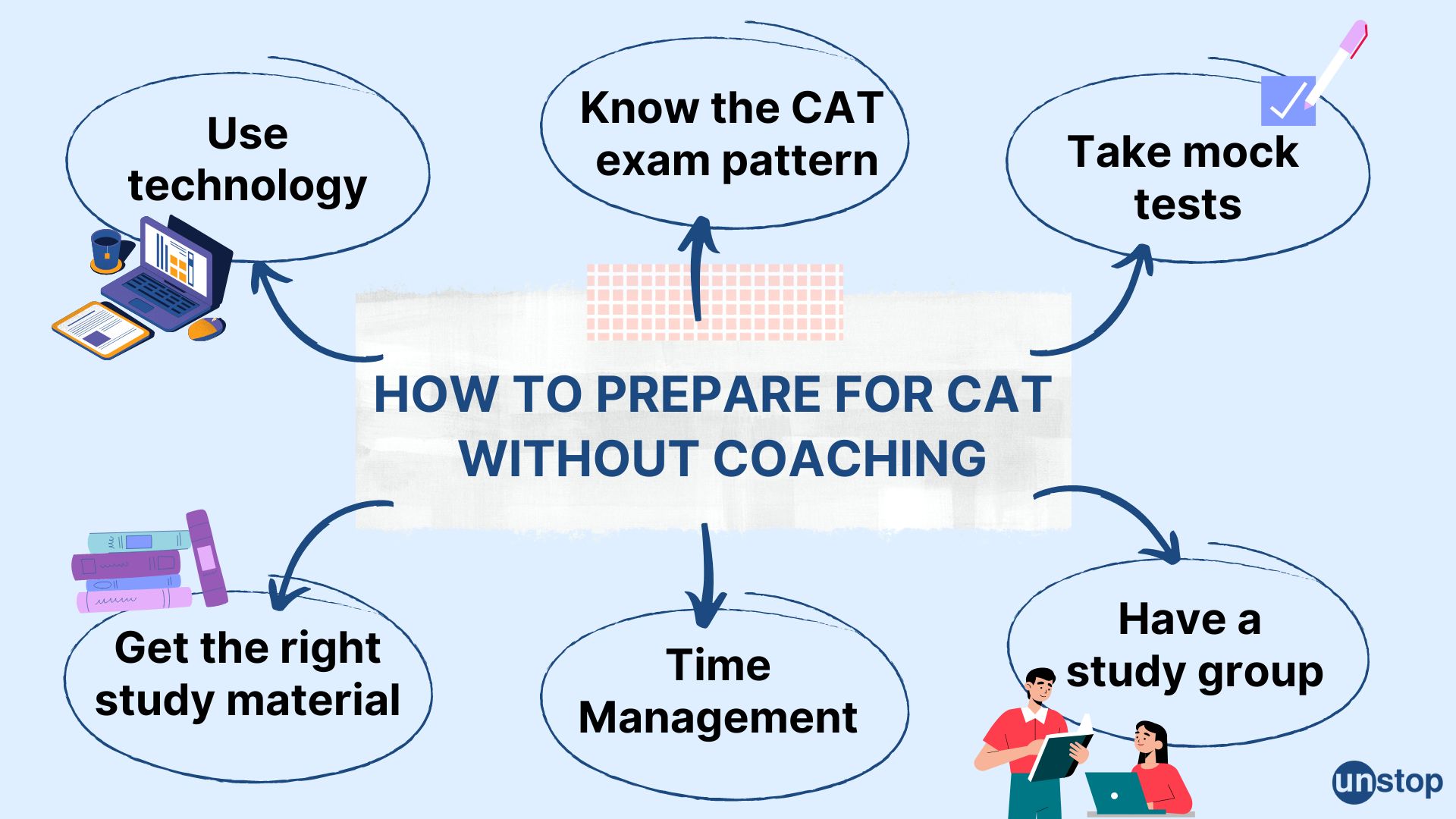- The Fundamentals
- Step-By-Step Guide
- Is It Possible to Prepare for CAT Without Coaching?
- CAT 2023: Eligibility and Exam Fee
- CAT 2023: Important Dates
- Exam Day Tips to Crack CAT 2023
- Other Important MBA Exams
- Frequently Asked Questions
How To Prepare For CAT 2026 At Home Without Coaching

Each year, thousands of candidates who dream of pursuing an MBA (Masters in Business Administration), take the CAT exam. In 2022, 2.56 lakh people registered for the CAT exam. Of these, 2.2 lakh took the CAT exam. This translated to 87% test takers - the highest in CAT history.
The Common Admission Test (CAT) is one of the most competitive entrance examinations in the country, conducted by any one of the 20 IIMs (Indian Institutes of Management). Last year, CAT was conducted by the Indian Institute of Management, Bangalore. CAT 2024 will be conducted by the Indian Institute of Management, Lucknow.
Though there are other exams that MBA aspirants can undertake, most premier B-Schools in India consider the CAT score for shortlisting candidates. Many candidates planning to take the exam this year, i.e. CAT 2024 have already started preparing for it. As the CAT preparation begins, so do the discussions about CAT coaching institutes. But, is studying at a coaching center a prerequisite to preparing for the CAT? Is it even possible to prepare for CAT without coaching?
Yes. It is possible to undertake CAT preparation without coaching. In fact, many CAT toppers did not go to a CAT coaching institute. And yet, managed to clear the exam with a great score. Going to a coaching institute for competitive exams has become the norm, but it's certainly not a necessity.
In this article, we'll take a deeper look at how aspirants can prepare for CAT 2024 at home by allocating sufficient time to all sections. By the end of the article, you will be able to answer for yourself, is self-study sufficient for cracking CAT?
The article also highlights tips to keep in mind for the exam day. So what are you waiting for? Let's dive in and learn all about studying for CAT without coaching:
How To Prepare For CAT Without Coaching: The Fundamentals
The first step in preparing for CAT without coaching is to focus on the fundamentals, i.e.:
- Know the exam pattern and syllabus
- Gather study materials and use online resources
- Prepare a schedule and stick to it
- Take mocks
- Join study groups
The fundamentals of preparing for CAT at home may appear simple. But self-studying requires candidates to put in hard work and consistently practice. Only then can one hope for acing CAT without coaching.
If you're prepared to put in the hard work, then here's a step-by-step guide on preparing for CAT by self-study.
How To Start Prepare For CAT Without Coaching: Step-By-Step Guide

Know the CAT Exam Pattern and Syllabus
The first step in preparing for the CAT at home is thoroughly understanding the exam pattern. It's crucial that aspirants have clarity about the different CAT sections, and take into account the sectional time limits and marking scheme while preparing for the exam.
Take a look at the CAT 2024 exam pattern:
| Category | Exam Details |
| Total No. of Sections | 3 Verbal Ability and Reading Comprehension (VARC); Data Interpretation and Logical Reasoning (DILR) and Quantitative Aptitude (QA) |
| Exam Duration | 2 hours or 120 minutes |
| Sectional Time Limit | 40 minutes per CAT section |
| Total No. of Questions | 66 |
| Maximum Marks | 198 |
| Marking Scheme |
Here's the marking scheme - There's no negative marking for TITA. |
| Mode of Exam | Online (Computer-Based Exam) |
| Type of Questions |
MCQ and TITA (Type In The Answer) - 4 answer options are available in MCQ - Candidates have to fill in the answers in TITA |
Apart from understanding the exam pattern, it's also important to get an idea about the CAT syllabus. Here are the three CAT sections:
- Verbal Ability and Reading Comprehension (VARC)
- Data Interpretation and Logical Reasoning (DILR)
- Quantitative Aptitude (QA)
Both QA and DILR sections have 20-22 questions, while VARC usually has 24 questions. In each section, 3-4 questions are devoted to a particular type or topic.

Till 2014, the CAT exam only had two sections - Quantitative Ability & Data Interpretation and Verbal Ability & Logical Reasoning. In 2015, when the Indian Institute of Management, Ahmedabad was conducting the exam, the exam was split into three sections instead of two. Thereafter quantitative aptitude became a separate section, while logical reasoning and data interpretation were clubbed together. The third section became Verbal Ability and Reading Comprehension.
Here's a brief look at what each CAT section comprises:
- Verbal Ability and Reading Comprehension (VARC): As the name suggests, VARC tests a candidate's English language skills and ability to understand the written word. The type of questions that appear in this section include passage comprehension, parajumbles, etc.
Read here about how the CAT preparation journey of Rohit Singh - a CAT topper who aced the VARC section.
- Data Interpretation and Logical Reasoning (DILR): DILR focuses on the type of questions that test a candidate's ability to interpret data sets and solve puzzles through logical reasoning. It's all about how one applies logic and common sense to problem statements. Some of the topics covered include Blood Relations, Coding-Decoding, Ranking, Logical Sequence, Charts & Graphs, etc.
Here are some tips on attempting the DILR section from IIT alum Avik Pramanik, who scored 98.52 in DILR.
- Quantitative Aptitude (QA): Quant covers mathematics, primarily arithmetic (fractions, decimals, ratios, etc.), algebra (linear and quadratic equations, log sets, etc.), geometry (basic geometry, circles, triangles, etc.), and modern mathematics (probability, permutations, etc.). The topics covered include a mix of basic and advanced concepts - but all that is covered in school.
This is how sociology student Ria Chaudhary scored 97+ percentile in Quant, without coaching.
Different candidates may find different sections easy or difficult, depending on their knowledge and comfort level with a topic. While engineers may think quant is a piece of cake, non-engineers may consider it to be the toughest of all sections.
Thus, the solution is not to study it all, but rather, to evaluate all sections and organize the topics according to your strengths and weaknesses.
Get the Right Study Material
Once candidates have clarity on the exam pattern and syllabus for CAT, the next step is to gather ample study material. Getting the right study material is a big source of concern for students opting for CAT preparation without coaching. This is because most coaching institutes provide study material to their students. However, if you want to study for CAT without coaching then figuring out study material should not stop you from doing so.
There is ample study material available for free, even for CAT preparation at home. It can include CAT preparation books, material like online blogs and newspapers for improving reading and general knowledge, question banks for mock exams, etc.
Going through every material published on CAT is simply not possible, no matter the time available. Thus, it's essential that candidates sift through the available resource and pick the right material. For example, CAT preparation books by Arun Sharma and Nishit K. Sinha are the go-to choice for most aspirants and former CAT toppers. And to revise and/or practice basic mathematical concepts, books by R.S. Aggarwal are a good starting point.
Ample study material, like question banks, blogs for reading comprehension, etc. are available online. As far as CAT preparation books are concerned, it's always better to go for the latest edition, which is likely to take into account any updates in the exam pattern or syllabus.
Though CAT preparation books in the market are a dime a dozen, listed below are some of the most popular ones, recommended by CAT toppers and experts:
Books for Cat Preparation: Quantitative Aptitude
- How To Prepare For Quantitative Aptitude For The CAT by Arun Sharma
- Quantitative Aptitude for CAT by Nishit K Sinha
- Quantitative Aptitude Quantum CAT by Sarvesh Verma
- Quantitative Aptitude for All Competitive Examinations by Abhijit Guha
Books for Cat Preparation: Verbal and Reading Comprehension
- Word Power Made Easy by Normal Lewis
- Mastering the Verbal Ability for CAT by Ajay Singh
- How to Prepare for Verbal Ability and Reading Comprehension for the CAT by Arun Sharma and Meenakshi Upadhyay
Books for Cat Preparation: Data Interpretation & Logical Reasoning
- How to Prepare for Data Interpretation for CAT by Arun Sharma
- Logical Reasoning and Data Interpretation for CAT by Nishit K. Sinha
- Logical Reasoning and Data Interpretation for CAT by Pearson
- Data Interpretation & Logical Reasoning by Gautam Puri
Creating A Preparation Schedule
You understand the exam pattern, are aware of the syllabus and have gathered the study material. Now comes the most difficult part - devising a preparation schedule for CAT and actually sticking to it.
Drafting a practical preparation schedule is the key to CAT preparation without coaching. It goes without saying that time management is crucial when it comes to CAT prep. Currently, the CAT exam is four months away. And there is still sufficient time to devise a comprehensive study plan.
Candidates can use a preparation timetable or schedule to prioritize the topics as per their strengths and weaknesses, assign deadlines for each topic, set regular reminders, and schedule time for practicing exercises, revising topics and taking mock exams. When creating a schedule, it's important to account for unforeseen delays or distractions, as well as balance the study time for CAT with ongoing activities, if any like regular college, or job. This will ensure that sufficient time is allocated to each topic and activity.
However, creating a study schedule is just one part. It's also important to stick to the schedule and update it on a regular basis, depending on your level of preparation and goals accomplished. Most CAT toppers dedicatedly follow a comprehensive study plan. For starters, a study schedule helps break down the CAT syllabus into smaller, achievable units. Moreover, it ensures that you don't exhaust yourself when preparing for the exam and can optimally manage your time and efforts.
Internet Is Not Just A Distraction
The internet is a great source of information if only used correctly. There is no dearth of online resources that candidates can refer to, for CAT preparation without coaching. From digital newspapers that can help you improve your reading comprehension and verbal ability to detailed, free tutorials on difficult topics - everything is available online.
XLRI student Divya Shah, who followed multiple free, live sessions on YouTube when preparing for her MBA entrance, states, "Since the internet has an abundance of everything, I had to filter my resources." YouTube is a great tool to get conceptual clarity on basic concepts.
Apart from the usual suspects, i.e. YouTube tutorials and online blogs, candidates can also join CAT prep groups on social media channels like Instagram, Facebook, or the latest, Threads.
Apart from these resources, podcasts are also a great way to improve your understanding of the CAT exam and get expert guidance, outside of coaching. Lastly, multiple online platforms also hold mock CAT exams that students can register for.
Create Study Groups
Aspirants who're looking to study at home can also join or start a study group. A study group helps in CAT preparation without coaching. Because members can keep each other on track. Study groups are also a great way to understand different methods of prep since not all the members in a study group may be following the same preparation strategy. Members can collectively solve queries, exchange study materials and swap notes on trick topics. Study groups create a healthy environment where participants mutually help each other. Most CAT toppers have talked about how having peer groups and/or study groups for CAT helped them stay motivated.
Attempt CAT Mock Tests and PYQs
It's important for MBA aspirants to take mock tests when preparing for CAT without coaching. While coaching institutes schedule mock tests for their students, they also offer the option of registering for mock exams and getting an analysis of the score. Apart from them, CAT sample papers are available on several other online platforms, and books with practice questions are also available.
Candidates should take mock tests for the entire CAT exam, as well as sectional tests. Sectional tests focus on one particular section of CAT - for example, a sectional test just to practice data interpretation and logical reasoning.
Mock exams should be taken on a regular basis and not just at the end of your preparation. By taking mock tests on a regular basis, candidates can gauge their performance over time and identity the areas that need extra effort. For example, if you're struggling with logical reasoning questions but are able to solve quant questions quickly, then you can tweak your schedule to add additional practice sessions for logical reasoning.
Candidates should also take CAT sample papers and section tests to get familiar with the exam pattern. However, when taking mock tests, a good practice is to attempt the exam in the same time as the exam duration. This goes for sectional tests as well - especially in areas of weakness. For example, if an aspirant can read quickly but requires considerable time in solving the quant section, then they need to put in extra effort in preparing for Quant. Thus, they should take multiple sectional tests for the quant section to improve their speed.
Candidates should also attempt CAT sample papers or sectional tests with different difficulty levels, and try to solve them in the specified exam duration.
Timing mock tests will enable candidates to balance accuracy with speed - both of which are extremely important factors to keep in mind, when trying to score a high percentile. Because CAT is timed and includes negative marking.
For this very reason, it's also a good practice to attempt PYQs, i.e. Previous Year Questions. PYQs enable candidates to better understand the type of questions asked. They also help aspirants understand the recurrence of question types Candidates can also fairly gauge the difficulty levels of the question papers, identify the areas that require extra effort, and accordingly, tweak their preparation strategy.
Lastly, it's not enough to just take the exam - you also need to be able to properly analyze the mocks and see how you performed during the test. When analysing results, it's imperative that candidates see how much time they devoted to particularly tricky questions as well as look for resources on how to solve tricky questions quickly. They should also see which sections take more time than others.
CAT is a strict exam because it does not award the luxury of silly mistakes and revisions. Thus, prepping for tricky questions, taking sectional tests, and timing yourself when giving mocks are some of the ways in which you can improve your chances of scoring high on the exam.
Is It Possible to Prepare for CAT Without Coaching?
Hopefully, the above guide makes it clear that it is, in fact, possible to prepare for CAT without enrolling in a coaching program. For one, expert guidance is not just available in coaching programs- it's also available in books, via online mentors, podcasters, and YouTube tutorials, to name a few sources. Secondly, even with coaching, CAT prep requires a fair amount of self-studying.
However, if you're still confused, you can opt for a hybrid mode of preparation strategy too - where you combine self-studying with partial coaching for CAT.
CAT 2024: Eligibility and Exam Fee
Now that you have a fair idea of how to prepare for the CAT exam without coaching, it's essential that you gather other relevant information about the exam.
Eligibility Details: The eligibility criteria for CAT 2024 states that all applicants must secure aggregate marks of 50% in graduation if they belong to the general and OBC categories. The aggregate marks are reduced to 45% in graduation, if candidates belong to SC/ST and PwB categories.
Exam Fees: The exam fee for CAT is INR 2,300 for candidates belonging to the general and OBC categories and INR 1,15 for candidates belonging to the SC/ST/PwB categories. The price was hiked last year.
CAT 2024: Important Dates

Apart from the aforementioned guide, it's important that applicants keep track of all important dates and deadlines for CAT 2024. This will ensure that you are not rushing to register at the last moment, or missing a deadline.
Registrations for CAT 2024 are yet to open, but the application form for CAT 2024 is likely to be available in August 2024. Last year, the registrations were open between August 3, 2022, to September 21, 2022.
Based on the analysis of CAT 2022, CAT 2024 Admit cards should be available in October 2024, and the exam is likely to take place in the last week of November. The answer key is usually available just a week after the exam, and the result is likely to be announced in January 2024.
Last year, the CAT exam was held at 293 test centers across 154 cities in India. The CAT exam took place in three shifts, morning, noon, and evening.
Exam Day Tips to Crack CAT 2024

Preparation for CAT does not end before the exam. So, here are some tips for the CAT exam day that candidates can keep in mind:
- Make sure that you carry the required Photo ID along with your CAT Admit Card 2024 on the CAT exam day.
- Reach the exam center early and avoid any last-minute hassle. Also, make sure you follow the instructions of the authorities.
- Avoid indulging in last-minute revision on the CAT exam day as this may lead to confusion.
- Attempt the easy questions first. This will give you a boost of confidence.
- Always keep an eye on the timer. Do not waste a lot of time on a single question. The key is to maximize your score.
- Focus on maintaining accuracy, because CAT has negative marking. Thus, read the questions clearly to avoid silly mistakes.
- Revision is a luxury. First ensure that you've attempted all the questions you're confident about, as well as given due consideration to tricky questions before revising your answers.
Other Important MBA Exams
While CAT is certainly one of the most important entrance exams for an MBA, it's not the only exam there is. There are several other exams for entrance into the B-School program that candidates can attempt. All of these exams have a similar difficulty level to CAT - between moderate to high.
Author and IIFT alum Nitesh Singh states, "Preparing for CAT does not mean that you sit only for this particular examination. Never underestimate the non-CAT exams because every year, they turn out to be life savers for a number of candidates."
Let's take a look at some of the other important MBA entrance exams, their difficulty levels, and conducting bodies:
| Exam | Conducting Body |
| XAT | Xavier School of Management |
| NMAT | Graduate Management Admission Council |
| GMAT | Graduate Management Admission Council |
| SNAP | Symbiosis International University |
| MAT | All India Management Association |
| CMAT | National Testing Agency |
| MICAT | MICA |
Frequently Asked Questions
1. When will the registrations for CAT 2024 open?
The registrations for CAT 2024 are likely to open in August. All notifications for CAT 2024 will be provided by the end of July.
2. Are there any books for CAT preparation that only focus on logical reasoning?
There are several books for CAT preparation that focus on logical reasoning. You can refer to any of the following books on logical reasoning to prepare for CAT:
- Logical Reasoning and Data Interpretation for CAT by Nishit K. Sinha
- Data Interpretation & Logical Reasoning by Gautam Puri
- How to Prepare for Logical Reasoning for CAT by Arun Sharma
-
Data Interpretation and Logical Reasoning (DILR) for CAT by Ronak Shah
3. Can you prepare for CAT without coaching?
Yes. Coaching for CAT is not mandatory and many aspirants in the past have cleared the exam without taking coaching for CAT. In order to prepare for the CAT exam at home, candidates must understand the exam pattern, gather the right study materials, craft a preparation schedule and stick to it. Candidates can also join study groups to stay motivated and exchange notes. The Internet also offers several CAT preparation tools - like free, online tutorials on YouTube, previous year question papers, mock tests, etc.
4. What type of questions can one expect in the VARC section?
The VARC section tests a candidate's understanding of the English language (grammar and vocabulary) and reading comprehension. It usually includes para-jumbles, passages on reading comprehension, odd-one-out questions and para-summary.
5. What are some things to keep in mind when getting books for CAT preparation?
Candidates should keep the following points in mind when buying books for CAT preparation:
- Always buy the latest edition
- Focus on your weak areas
- Refer to the experts
6. What type of questions are asked in CAT?
CAT is a computer-based exam, conducted online. The type of questions asked in the CAT exam are:
Multiple Choice Question (MCQ): This type of question includes multiple answer options, but only one correct answer. CAT includes MCQs with four answer options.
Type in the Answer (TITA): These are the non-MCQ questions in CAT. In this type of question, candidates have to type in the correct answer. Though this type of question has no answer options to choose from, it also holds no negative marking in CAT.
7. What after CAT?
The CAT exam is the first step in starting your MBA journey. After you've taken the CAT exam, prepare for the subsequent rounds in the admission process, namely the group discussion and interview rounds. Most colleges shortlist candidates on the basis of their CAT scores and then invite them for a group discussion and interview round. Some colleges may even have an extempore round.
8. Do we have sufficient CAT preparation time, if we start now?
Yes, there is still sufficient time to prepare for CAT. To start with, divide the topics according to your strengths and weaknesses and focus on topics where you do not have conceptual clarity. Once your basics are cleared, move on to regular practice, sectional tests, and timed mocks to improve your chances of acing the exam.
9. How many mock tests make for ideal CAT preparation?
If you're taking the CAT exam for the first time then you can start with taking two mock tests per month and increasing the number closer to the exam date. For example, if you start preparing in March, then you can take 2 mocks in a month till June, and gradually increase the number by 1 or 2 (depending on your level of preparation) till November. You should ideally be taking 6-8 mock tests in the last two months prior to the exam. Overall, CAT toppers usually take 30-40 mock tests before the exam. However, keep in mind that attempting too many mock tests can also lead to burnout. Ultimately, there's no fixed number of mock tests to take before the CAT exam.
In summary, cracking the CAT exam without coaching is certainly not easy, but it's doable. However, whether you take coaching, opt for self-study, or go for a combination of both, it's important to work hard, consistently practice and stay motivated. Ultimately, trust yourself and you're sure to ace the exam. Best of luck!
Suggested Reads:
- Scoring 98.99 Percentile: XLRI Student Divya Shah Shares Her MBA Admission Experience
- Scientific Tips and Tricks to Score 99% in any Competitive Exam
- When I cleared the CAT exam without leaving my job | Karanveer’s story
- Surviving the final year of engineering and preparing for an MBA | Naveen Ayyalasomayajula – SIMS Pune
- Top tips that will help you clear a CAT exam efficiently | Palash Jhawar – MDI Gurgaon
I’m a reader first and a writer second, constantly diving into the world of content. If I’m not writing or reading, I like watching movies and dreaming of a life by the beach.
Login to continue reading
And access exclusive content, personalized recommendations, and career-boosting opportunities.
Subscribe
to our newsletter















Comments
Add comment